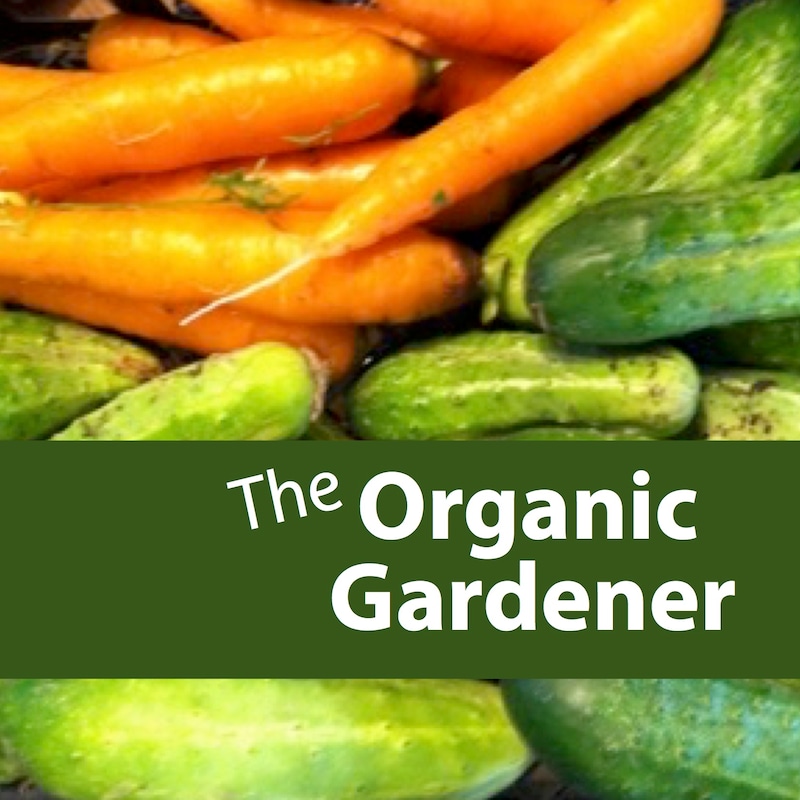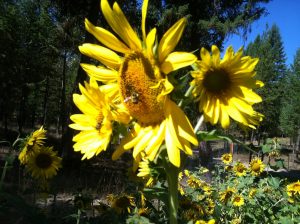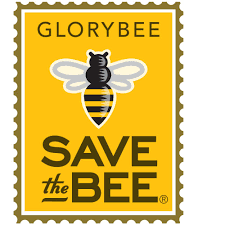
Shownotes
It is election day and I’m excited to have a guest here to talk about Bee-Friendly Gardening and Bee-Friendly Practices and sustainability! from GloryBee in Eugene Oregon here’s Shandy Carroll!
It is election day and I have my mail in ballot in my purse and I’m excited to where my sticker the rest of the day!
Tell me about your first gardening experience?
I actually grew up in New Zealand, apparently my sentence structure is British Colony, which I really don’t know what that means. So, I grew up in New Zealand in a fairly rural part in a town known for it’s diving and fishing. I grew up in a nice area with a great big garden and a view of the ocean!
The great thing about that spot was we could grow whatever we wanted! It’s pretty temperate located at 34º south on the coast
- tomatoes
- carrots
- lettuce
- kale
All these things meant my mother didn’t have to drive 30 minutes into the supermarket too often.
We had a really fun kitchen garden! So that was my first experience with it!
I live in an apartment now my garden is some basil that is quite sad and some succulents that are doing pretty well because I can ignore them!
I admire folks who are able to garden and my neighbors who have an amazing garden on their balcony.
Sound issues of restaurant?
Tell us about Glory Bee !
Glory Bee is a family owned company in Eugene OR it’s been in business since 1976. I have worked there for the last five years as the sustainability manager!
The main products are natural food ingredients
- 30% of honey
- nuts grains
- flours
- sweeteners like agave and molasses
once a year we bring in bees
We have a partner who is a bee breeder. We have a a whole big event
introduce our customers to bees and their hives. We have a whole education piece.
Anyone can come that wants to learn about bees, they don’t hae to be getting bees to attend right?
sell NUCs and hives
and educational events
Yes, anybody can come to the event
It is in Eugene Oregon.
we have food trucks and music
Try to have lots of vendors that can talk about bee-friendly practices and bee friendly gardening!
bee friendly practices
for folks like myself where I don’t have a garden, I do live in an apartment complex. So I don’t have a garden so the easiest thing is to do is
Have a side conversation with the property manager
make sure that we are not putting harmful pesticides on the flowers. That’s important to because I have a pet and friends that come to visit so I don’t want pesticides sprayed around my home.
products that are pollinated by bees are best to be organic for the bees. So sometimes that’s really easy to do. Where I live avocados that are pollinated by the bees.
organic avocados cost like 10¢ organic almonds
What about bees and almonds?
My husband is always concerned about the water with almond trees that they require and the droughts in California.
I know, that’s concerning
I live in California, I’ve seen they’ve had to pull out almond plantations because there isn’t enough water for that agriculture sometimes.
They’ve put in a lot of really friendly water saving practices so most of the existing almond farms have drip irrigations that’s because the price of water is going up so it makes business sense for those farms to put in those practices.
Sometimes that is an excuse for people to eat cheese and not almonds, but the amount of water that goes into producing the amount of a pound of almonds vs a pound of meat it’s disproportional the amount of water needed to produce a pound of meat.
it’s interesting to get hung up on the popular boogie man
the big picture
we do need to eat locally as close to your home as possible and as much plants and vegetables as possible.
That’s the biggest environmental impact we can make!
Well, we don’t have almonds in Montana, so that’s part of why I go back and forth thinking like would it be better for me to have a local cow. My mom’s been buying goat cheese in NY from Bozeman, MT
So what other gardening tips do you have to share?
If you have a garden onsite if you can do some good things with the bees.
Keep a look our for any sort of pesticide that has a neonicatinoid
It’s best to avoid it completely!
Lots of states are passing legislation that clearly says that on the label that it’s harmful to bees.
That’s the main ingredient
what it does it gets the bees excited
sugary candy
eat some other pollen and get some diversity in their diet
Just like anybody that easts too much sugar would slowly die so it’s best to
avoid Neonicotinoids
If there are other insecticides that you have to use them do it when there are
no flowers
if you have to use them when there are flowers
- at night
- not on the flowers
- really topical applications
What does that mean really topical applications?
I think that means you spray on the dirt and not on the flower.
bugs on the leaf
make sure you keep it off the flowers
most folks are happy in their own gardens to avoid those pesticides that will harm the bees in anyway.
Find a different way to keep pests out of your gardens like
-
essential oils
-
coffee grounds
How about ways to encourage bees to grow in your garden?
That’s the really fun way of bee friendly gardening is having flowers throughout the season.
Planting gardens that will flower and attract bees was starting as early in the season as possible or late
Especially where it gets cold in the winter is giving those bees a really good pollen source!
All season long! Through late summer
I’m not an expert on what flowers all season long but I know a lot of herbs come on early and then the seasonal flowering fruits and vegetables that come on late on the season.
That’s true my chives are some of the first that come on and then the dandelions and then my oregano and what I love about herbs is that they usually take care of themselves, they’re easy to grow and they are perennials.
At least for me. I was talking to someone the other day in California who said it was so dry it was hard to keep herbs growing and that she had a lot of succulents like you.
I think the bees visit the succulents but they are not as in to them as other more colorful plants.

Bees seem to love
- lavender
- sunflowers
- different more colorful
I can’t tell if some of them do, they have such a microclimate IDK if it’s so hot on my porch IDK if that’s why they bloomed
I do, her name is Nell Foster who I talked to at the beginning, her website is Joyous Garden, she is really active on twitter from Santa Barbara. My mom has like a million succulents, the last time I was in NY she has as many plants indoors as outside. I have to say, I felt like the air in her house was cleaner because of her plants.
I love them but I have trouble keeping them alive, they take a little more concentration then I give them.
Do you want to talk more about Glory Bee and their products.
Im the sustainability manager so their products are available on line.
the things I’m really excited about Glory Bee is they’re a family company they get to act independently. They can really act, the management can decide to do things like
Save the Bee Program
is a social initiatives program stated at Glory Bee, started in 2012
it’s our way of trying to help prevent colony collapse disorder and save honey bees.
It started because our founder is a beekeeper, he had up to 300 hives when he started.
Then, as the company grew he stopped keeping hives, he put his effort into the company and now his son who is our current president.
They’re expert bee keepers but they still lose about 1/2 their hives and they are so upset by this.
It’s really upsetting in the spring to go out and find half your hives are gone
What can we do to save bees?
- what is the best way we can save the bees
- fund research
- outreach and education – particularly for part time beekeepers and backyard gardeners
- support any kind of legislation that makes a lot of sense
- like putting labels on privately available that harm bees
So people know what they are spraying in their homes.
So putting labels on products that are available that harm bees. What other legislation else makes sense?
That’s the main one, there’s other legislation that supports backyard gardener and small holder farms in the US. There’s also like beekeeping as a business it’s important and write letters towards.
Its hard to be a beekeeper in the U.S.
It’s important because most of our honey has to be imported from overseas which is harmful to the environment and it’s also kind of a bummer because beekeeping is this incredible American tradition and then when folks
lose 1/2 their hives
Why are people losing their hives, is it because of all the pesticides we’re putting on the planet? I mean they didn’t used to lose 1/2 their hives right?
it’s between
- commercial beekeeper will lose about 35% of their hives some are less and more
- backyard beekeeper will lose 50%
part of the reason is around the learning curve
if you’re new on the learning curve you’re more likely to lose a hive, that’s just being really familiar with the bees
that baseline 35% of really experienced beekeepers are sill loosing their hives
The bees are visiting these neonictanoid crops with pesticides on them, is getting the bees focused on one different pollen not getting their nutritional needs met from lots of different pollens, they’re not coming back to the hive and being really strong because they’re eaten lots of different pollens. They have just been going to the one’s with the neonicatinoids that are the ones that tastes really good so it’s basically like feeding bees junk food so they are not as healthy going into the winter.
The same goes for mono cropping
It’s the same problem with the almond populations and plantations in CA the bees are only visiting almonds and are not getting some other protein mixed in there from different pollen, they go into the winter weaker less able to survive!
Anything else you want to tell us about the sustainability part?
one more thing that I think is just awesome
